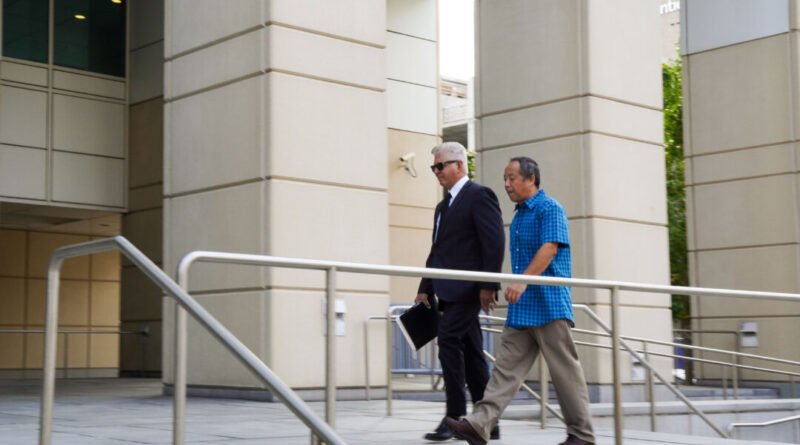Engineer from Florida Admits to Serving as Beijing’s Agent
The U.S. citizen and longtime Verizon engineer was the childhood friend of a Chinese intelligence officer.
TAMPA, Fla.—A Florida engineer has pleaded guilty to acting as a Chinese agent to collect intelligence on dissidents and U.S. nonprofits and firms.
Under the direction of the Ministry of State Security, China’s top intelligence gathering agency, Li collected a wide range of information on the targets of the Chinese regime, including pro-democracy activists, practitioners of the persecuted faith group Falun Gong, and his former employer, U.S. telecom giant Verizon, court filings and his LinkedIn profile show.
The court document also said he discussed hacking tactics with a Chinese intelligence officer and provided cybersecurity training materials from his current employer at the officer’s request.
Li faces up to 5 years in prison along with a maximum $250,000 fine, as well as up to three years of supervised release. He would also be asked to make restitution to any victims of the offenses, according to the plea agreement.
The sentencing hearing is expected to take place in 70 to 90 days.
One of Li’s earliest assignments in 2012 was to collect information regarding lawsuits that Falun Gong practitioners planned to bring against Chinese state government officials, according to court filings.
In August of that year, about a month after he traveled to the central Chinese city of Wuhan to meet with a provincial-level Ministry of State Security officer, Li thanked the officer for “the help that he had provided when Li was in China,” the court document states.
Li then shared biographical information about an attorney in St. Petersburg, Florida, he had spoken with, saying that the attorney had lent his wife some Falun Gong books. He also provided information about a blog the attorney had written for a Falun Gong-associated publication, according to the court filing.

The Middle District of Florida in Tampa, Fla., on Aug. 23, 2024. T.J. Muscaro/The Epoch Times
In five days, the officer wrote back thanking Li for the information. Addressing Li as “bro,” the officer asked Li to “look out for movement of the pro-democracy activists” ahead of a key upcoming Chinese political leadership conference, the 18th Party Congress, and “pay attention to whether anyone you know works at the CIA or FBI.”
Asked by the Chinese officer in April 2013, Li sent public information and the social media handles of two Israeli authors who had penned books concerning Falun Gong. In September 2014, the officer again tapped Li to hunt for information about Falun Gong, providing Li with biographical information about a Falun Gong practitioner from Hubei, including his California home address, phone number, and the make and model of his car. He said that the man had protested in front of a Chinese consulate in California. Li responded the same day with information about an individual he believed the officer was looking for.
Two days later, Li made additional internet searches of the person and shared his findings with the Chinese intelligence officer.
Li and the officer had maintained close relationships throughout the years, the prosecutors noted at the hearing. The two frequently referred to each other as “brother,” and according to court filings, the officer and his colleagues treated Li to a hot spring in Beijing in December 2014.
They also made various efforts to disguise their communications from U.S. law enforcement, including by routinely deleting emails and materials Li had provided and creating multiple fake accounts. Li, lacking a Chinese phone number, asked the officer to help set up a shared account on the Chinese social networking platform Sina, which they used to transmit documents.
The ministry officer also tasked Li with conducting research on other topics to further his agency’s mission.
He had asked Li about the new Chinese branch offices of his then employer, Verizon, in 2015, to understand whether “the company was engaging in any data collection in China.”
In March 2022, the officer inquired Li about his current employer—India’s second-largest information technology company Infosys—and its customer base. He also asked for materials on the firm’s cybersecurity training and discussed hacking tactics that could be employed, according to the court document. Li replied with a cybersecurity manual and gave a description of his employer and its customers.
In June of that year, Li also helped the officer find details about the property address of an individual in Ezhou, Hubei, the officer’s home province, including the real estate company website with photos and the tax information for the property that identified the owners. The individual had fled China after committing some actions that offended Beijing and was on a “wanted” notice from Hubei security officials.

Ping Li and his lawyer Daniel Fernandez arrive at the United States District Court for the Middle District of Florida ahead of a court hearing in Tampa, Fla., on Aug. 23, 2024. T.J. Muscaro/The Epoch Times
Li, who acquired U.S. citizenship about two decades ago, appeared in a sapphire blue T-shirt at the court hearing on Friday. When asked if he regretted his actions by The Epoch Times, he said “no.”
His lawyer Daniel Fernandez insisted that the case is “not espionage.”
“He provided information to childhood friends that became government employees. And the information shared is public information that you could Google,” he told The Epoch Times. He added that Li was aware the officer works for and was reporting to the Chinese state. He’s “taking responsibility,” Fernandez said before the hearing.
The case, he said, represents only the tip of the iceberg. There are “many other Chinese spies still living in our community,” he told The Epoch Times, adding that he’s glad U.S. authorities are paying attention to covert Chinese operations.
“I hope, by this guilty plea, he can really repent what he did,” he said. “I don’t hold anything against him. I just hope he really thinks about the damage his action can cause.”
Two other China-related prosecutions have led to guilty pleas recently.





